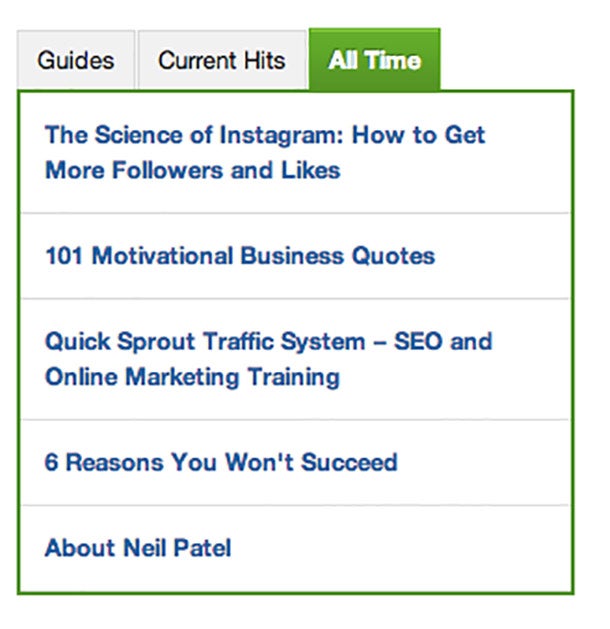Writing Tips: How to Come Up With 50 Topic Ideas in 30 Minutes

BY NEIL PATEL | June 2, 2014|
4 Comments |
The core issue for many content marketers is this: How do I come up with article topics? Without topics, you have no articles, no content, and therefore no content marketing. It’s obvious that we need to figure out how to come up with topic ideas quickly and effectively.
That’s why I put together this brief guide on how to come up with 50 topic ideas in 30 minutes. My goal is for you to read this article, then be able to spend half an hour to come up with your own set of topics to write about on your company’s website.
Before you start, some quick rules:
The idea behind this exercise is quantity, not necessarily quality.
You might come up with some junk ideas as you race to write them down, but at least you’ll come up with ideas. Those ideas can be massaged and coaxed into an awesome title or topic for a winning article. Don’t let the perfect be the enemy of the good.
Force yourself to write stuff down.
When you actually begin to type words, you begin to come up with more ideas and to think in clearer ways. There are three major sections I’ve outlined in which you will be prompted not just to think of ideas but to write those ideas down. This exercise will be completely useless unless you actually write things down.
This is idea generation only.
Now is not the time to assign article topics, craft the perfect headline, or create the chapters for your ebook. This isn’t an editorial calendar. This isn’t article outlines. These are ideas, pure and simple. Confine your efforts, and you’ll maximize your productivity.
Be as specific as possible.
The following is a process for coming up with tons of topic ideas, but the specifics are up to you. As you write stuff down, also force yourself to be specific.
For example, in a section below I ask, “How did you get started in your industry?” Come up with two specific topics based on that question. If you write down something like “Why You Should Go to College,” you’re not getting it. Instead, write down something really specific and personal.
One of my first entrepreneurial gigs was selling CDs in high school. I could have chosen to sell pirated CDs, but I opted for the legal route. That simple choice shaped the direction of my business. So, maybe I could trace out an idea like this: “Why I Didn’t Choose an Illegal Job, and How It Shaped My Life.” See how a specific trigger event can spark a killer idea?
Related: 8 Must-Have Ingredients of a Successful Blog Post
Now, let’s come up with 50 ideas...
1. Go to a place that is free from distractions and interruptions.
This doesn’t need to be anywhere magical or special. Just turn off your phone if that helps.
2. Open a document to capture your thoughts.
Since our goal at this point is speed and efficiency, it doesn’t matter what note-taking application you choose. I use Evernote and Drive for quick-and-easy document creation.
Google Drive makes it easy to create a file. Plus, you have it saved forever in your Drive archives. Evernote, meanwhile, functions as a de factobrain for some people. It’s perfect for storing ideas.
3. Start your timer for 30 minutes.
Having a specific amount of time will force you to be productive. It’s focused time. Knowing that the timer is ticking down the seconds will either paralyze you or motivate you to action. If you feel paralyzed, remember that you need to kick yourself into gear.
4. The question phase.
Time: 12 minutes
Goal: 25 topics
Instructions: Ask yourself the following questions, and try to create at least two topic ideas from each one:
What are you passionate about in your industry? Is there a certain angle or approach that gets you excited? What’s your greatest skill? What do you prefer to spend most of your time on? Rather than answer these questions directly, think of article angles that you can derive from them.
For example, I’m passionate about content marketing. It’s what inspires me, and I’m convinced it’s the key to online marketing success. But I’m not just going to write an article on “Why I’m Passionate about Content Marketing.” Instead, I’m going to channel that enthusiasm into a major work that I can get excited about, like an advanced guide to content marketing.
How did you get started in your industry? Everyone enters their niche in a different way. How did you get interested in your area? What training did you have?
Don’t be afraid of getting personal here. The best content is stuff that is personal, while still actionable and oriented to your audience. People love to hear about others’ experiences and to read things from a first-person perspective.
Again, use your answer to this question as an article topic. For example, if I started as an online marketing professional by facing a traffic challenge on a small-time ecommerce site, I can tell that story, while providing a lot of great advice. Maybe it can be something like, “Five SEO Lessons I Learned While Working on a Struggling Ecommerce Site.”
Why is your product the best? If you sell a product, you are hopefully convinced of its value. Why does it rock?
What are some mistakes that people make in your industry? Every industry has its pitfalls. What are some in your industry? What makes people go out of business, experience a slump, or lose interest?
What is the greatest challenge in your industry? If you tell people how to overcome common industry challenges, they will eat your content up. Jot down the biggest challenges, and just write “solve it!” beside them. You’ve got an idea that can transform into a powerful article.
What does success look like in your industry? What does it mean to get to the top or to dominate? How do you get there?
Who is the most successful person in your industry? Write down their names and the word “interview.” Later on, you can call them up to request an interview, or read other interviews that they’ve participated in. From published interviews, you can pick up on a salient point and tease it out into an article or two
What is the biggest news in your industry? One of the richest sources of articles is contemporary industry news. Turn your mind to the breaking news, and jot down a couple ideas.
Related: Why You Should Create Long-Form Content (And How to Do It)
What is a success story from your business? Biggest failure? Stories of personal experience are perfect for article topics. Want to write an article that gets read and shared? Discuss how and why you failed at first, or what factors led to some huge success.
What personal skills help someone become successful in your industry? This is easily a top 10 list -- several of them, actually. From time-management tips to email ninja advice, you can bust out a bunch of practical and tactical advice that will really appeal to your audience. Everyone wants to become successful. This series of topic ideas tells them exactly how to get there.
What tools do you use to get your job done? This is another list or top 10 article. What kind of things do you use -- a desk, a Macbook, an iPhone, a Bluetooth device? What about mobile apps? Web apps? Data storage? Coffee? Write it down.
Where, when, and how do you do your best work? Each industry is going to have its own take on getting stuff done -- the hows and whys. You can become the authoritative voice in your industry for how to do it. Think about tips like avoiding burnout, maximizing productivity, and accomplishing major tasks.
Why do you enjoy being in your industry? There may be some days when your work is a chore, but what about those bright moments? How do you stay motivated in your industry? How do specific challenges motivate you? How do the experiences intrigue you?
What is changing in your industry? Every industry has its developments, technological innovations, and major shakeups. These are great current topics that will fuel search queries and drive traffic. Jot down a few of these changes, and pull out some article topics. Most of the time, you won’t be able to posture yourself as a breaking news provider. Rather, you should take the position of providing opinion, commentary, response, or advice based on the developments.
What are some processes or practices that you have perfected? If you’ve achieved some level of expertise in a specific area, describe how you did it. Advanced guides and detailed topics are best. I’ve done this with SEO and content marketing and seen some really strong returns from it.
5. The Search Phase
Time: 12 minutes
Goal: 25 topics
Instructions: Here, you’ll enter the search phase -- actively seeking out ideas elsewhere on the web. Perform each of the following searches, and jot down at least five ideas from each source.
Related: 17 Content Pieces You Can Create Without Writing a Single Word
Visit the blogs of industry leaders. What are other leaders saying? If they are all discussing similar things, there’s a good chance you need to be part of the conversation. Join the topic and provide your own angle.
Some blogs share the most-visited or most popular posts. There’s a good chance that the top post is an evergreen topic that continually drives traffic. Take that topic, reshape it, and use it yourself.
Here’s what’s most popular on my blog:

Simply browsing around on an industry leader’s blog for two minutes should give you plenty of fresh ideas for content.
Visit the major industry websites. Beyond the blogs, there are other websites that provide industry information. In my niche, for example, Search Engine Journal and Search Engine Land are great sources for news and authority discussions on topics. If you’re in SEO, you can invariably extract some topic ideas from a one-minute survey of the homepage.

Visit the social profiles of industry leaders. Focus on Twitter and Google+. If you’re following other leaders in your industry (and you should be), track down their presence on Twitter, and Google+. Here, you’ll find the thread of their conversations, topics that they’re dealing with, and issues that are hot. Assuming you’re aware of four or five leaders, you’ll quickly gather fodder for dozens of ideas.
Here’s a quick glance at Barry Schwartz’s Google+ profile.

And here’s a visit to Danny Sullivan on Twitter:

Search Twitter for trending topics in your industry. Twitter is perfect for getting the buzz on current events related to your niche. Use Twitter’s search function to find out what’s trending in your particular niche. To go a step further, Twitter has a customizable trending section that you can tailor to match your exact interests.
Navigate to the Twitter home, find “Trends,” and click on “Change.”
Use Google autocomplete to come up with keywords and related topics. Google search alone is a powerful way to generate keywords that can morph into topic ideas.
From Google.com, start typing in a keyword of your industry. For example...

Continue typing. I suggest a verb.

Already, you have some ideas. Keep changing up the verbs, the keywords, and the order of words.



6. The rumination phase.
Time: Six minutes
Goal: Extra topics
Unplug and write stuff down. Now that you’ve absorbed this torrent of information, you probably still have ideas percolating in your mind. These are probably the very best ideas that you’ve ever come up with. Your mind has been pushing hard for twenty-four minutes, crawling through industry-specific topics, and generating ideas galore. Finally, relax your mind just a bit, and let the good ideas flow.
What’s next?
If you’re still in the topic-generation zone, just let your timer go off, and then keep going. You can come up with 100 topics. Or, you can start honing your titles, developing outlines, and annotating your list.
By spending 30 focused minutes, you can come up with enough content ideas to last for months.
Final Tips
Beyond your focused topic-generation sessions, you will always have some ideas floating in at random moments. Here are two closing tips to continually inspire and capture those great topic ideas.
Always be writing stuff down. Creativity gurus explain how, from a scientific perspective, our best ideas come when we’re totally disconnected from our work. It could be when you’re jogging, showering, or waking up in the morning. That’s why you need to always be writing down your ideas. Since you probably keep your phone nearby anyway, use it to jot down those ideas that come on the fly. Notes or Evernote are great options.
Always be learning. Whether it’s from reading, talking, watching Ted Talks, or trolling social media, you should always be in learner mode. The more you take in, the more you’ll be able to come up with great topic ideas. Absorb, read, consume, gain information. Always.
Copyright © 2014 Entrepreneur Media, Inc. All rights reserved.

No comments:
Post a Comment